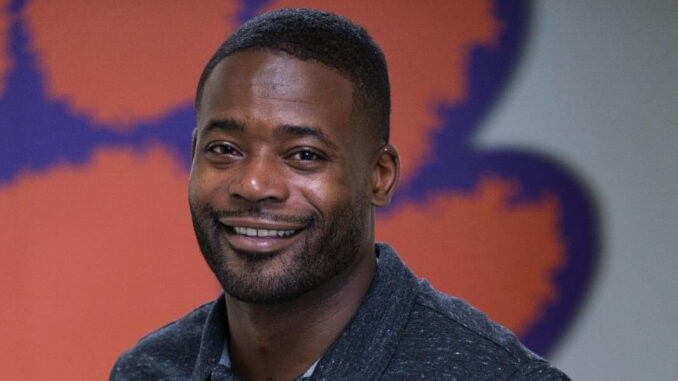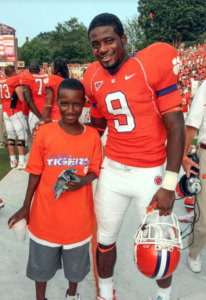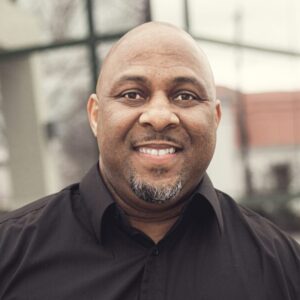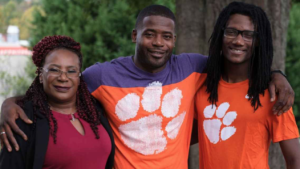
Dr. Martin Luther King Jr. said, “The ultimate measure of man is not where he stands in moments of comfort and convenience, but where he stands in times of challenge and controversy.” Ray McElrathbey embodies the character that Dr. King expressed. McElrathbey — known as “Ray Ray” on the football field — found himself between a rock and a hard place after he committed to play for Clemson University.
With his mother battling addiction and his younger brother left to fend for himself, McElrathbey had to juggle caring for his little brother, Fahmarr, while fulfilling his duties as a student-athlete. The Disney+ film “Safety,” the story of McElrathbey’s life, reveals some of the many challenges he faced, including getting his brother to and from school and sneaking him into campus housing. McElrathbey has since started a foundation to help families in similar situations; it provides help with addiction and training in money management and other life skills.
In a conversation with Zenger News, McElrathbey addresses the accuracy of the movie, discusses the challenges he faced in college, and offers an update on Fahmarr.
Percy Crawford interviewed Ray McElrathbey for Zenger News.
Zenger News: Congratulations on the success of “Safety.” You have an amazing story, and I couldn’t think of a better time to release an inspirational movie like that because we need it.
McElrathbey: I appreciate it. It was a long time coming, so anytime it came out, I would’ve been excited. But it was definitely needed — not just for me, but for the world, with all the trials and tribulations we’re facing.
Zenger: It was 14 years in the making. Did doubt ever creep in and you think this film would be scrapped and never see the light of day?
McElrathbey: Oh, most definitely! Fourteen years is a long time. I can’t say that I was optimistic through it all. No, there were times where I was like, “It’s not going to happen,” but in my mind, it was my life story and I had a lot of life left living, and maybe it will make the story better. I’ve lived enough for a sequel. It’s been a process. Fourteen years, so…
Zenger: What was the holdup? Information-gathering, someone buying in on the idea, or just finding the right fit?


McElrathbey: Well, a number of different things. A lot of studios were asking, “What will we end it with?” If you’re doing a life story on someone and they’re 19, or 22, or 24, it’s the life story of a kid that most people will say haven’t grown up yet. Even myself, I went through a process where I thought, “Why would they make a movie about me?” But there are a number of different things that happened, and we ended up here, and I’m grateful. The process took 14 years. I signed about three deals within that. You go in, they’ll do an initial option. They pay you a flat fee, and then if the movie goes into production, then you get a lump sum. I did that several different times with several different studios, but the producer of my movie, a gentleman named Mark Ciardi, had done other films with Disney, so there was always that possibility that Disney could pick it up, but until Disney+ came along — it made it a perfect storm type of situation, so it was timing more so than anything, I believe.
Zenger: Anytime you put your life story out there, to a degree you have to be a little bit vulnerable. Were you ever skeptical about putting this film and information out there?
McElrathbey: No! Not up until this point, because the parts that people thought were exciting about my life — which are the parts that the movie covers — I don’t necessarily find that as the most impactful parts of my life. Those were the parts that I think would help the masses the most. Because in the unique situation I was in… I was a college athlete playing D-I football. So, some people will separate themselves from that: “Well, that couldn’t be me because I’m not a D-I football player at Clemson.” But there are more parts of my life when I was more of a regular person. When I was a kid, and I was going through the struggles that I was going through. When I had to worry about where I was going to sleep and what I was going to eat, and if it was going to be a good day. Dealing with my mother’s addiction. Those were more impactful times — and more noteworthy times in my life — where I really had to persevere.
During the times I was at Clemson, not that it wasn’t a task, but I had my basic needs met — what I was going to eat, where I was going to sleep. I was on meal plan and I lived on campus. That’s more than a lot of people can say that they have — a roof over their head and steady meals. With the addiction part, I think that speaks to a whole other community of people that needs to see that. And how I persevered through those times, and how my mom persevered through those times, and the things that she went through. And to know that is not easy. At the end of the day, you see the movie and you think that, even after the movie, that things are great. No! That’s not the case. It’s a process every day. I have my ups and downs, I am not perfect, and there are things that I go through still. And I think those are more important things in my life to highlight.
Zenger: Yeah, it’s easy to get the perception of, since you carried such a heavy load when you were younger, that as an adult everything is roses and all good with you. Do you think the film — and not in a negative way — gave a little bit of a misperception of what your life is today?
McElrathbey: In some respects. Or even what life was like for me then. There were some tough times. But there is only so much that they can cover. There is only so much that we can discuss. In the parts when dealing with my mother or dealing with my father, which are the parts that I think makes me more vulnerable. Talking about those things makes me more vulnerable, and it wasn’t able to be talked about in the film. So, it’s more of a happier picture because, like I said, some basic needs are met in the movie. It’s part of the movie business. I do believe that there will be other ways where I will show and share what I went through and how I went through them.
Zenger: Would you consider writing a book, or do you feel it’s better served keeping it on film?
McElrathbey: No, no, no. I am writing a book, currently. I am hoping to release it in June, no later than July.
Zenger: Anytime I watch a biopic, I am always curious about the accuracy of the film. On a scale of 1 to 10, 10 being very accurate, how accurate is “Safety”?
McElrathbey: Seven! I would say a seven. A lot of the things that happened in the script was somewhat mixed around in terms of the sequence in which they happened. So, that’s what takes away a lot of the accuracy as far as for me. And then just the characters — the individual people, names and mannerisms, more than anything, weren’t covered. So, that gives a little less authentication to these particular parts of the film. But a lot of the situations, a lot of the things that were shown in the movie, is actually things that I went through, it’s just the order in which it happened, and the people that were there when it happened, are quite different.
View this post on Instagram
Zenger: What did you think of Jay Reeves’ portrayal of you in the film?
McElrathbey: He did a great job. The parts where he might have been doing something different than I would say I would do, I let him know. I was on the set. The director would tell me to always put my two cents in, and he was always willing to hear what I had to say, if I think things should be shown or not shown, because it’s my life. He wanted it to stay as authentic as possible, while doing me justice, as he would say. I was lucky to work out with Jay Reeves and hang out with Jay Reeves. A lot of the mannerisms he picked up on from being around me for so long. We only lived a mile and a half away from each other in Los Angeles when he got the role. We went to the same gym, but never really hung out with each other, never really crossed paths, in a sense. The first day I heard he got the role, I hit him up, and we went and worked out. From there, we were good friends, I trained the cast, and I was there every day on set.
Zenger: How is your little brother, Fahmarr, doing today?
McElrathbey: Ah, man, Fahmarr is getting on my nerves. I say that in a loving brother/father type of way. For me, I want him to know exactly what he wants to do and how he wants to do it, right now. And at his age, I didn’t know what I wanted to do or how I wanted to do it. Fahmarr’s great. He’s living life the best way he knows how, as far as I’m concerned. He’s having fun. He’s actually still living in South Carolina. He will be doing some things with me in the future, as far as speaking is concerned, and he’s helping me out with my foundation. He’s doing great.
Zenger: Tell us about the foundation.
McElrathbey: I’m looking to help individuals like myself and families like my family. Families with a hint of dysfunction, but are good families, and good-hearted people. I’m looking to assist them with various needs — financial needs, organizational needs, and hooking them up with services that are provided for families like those types of families. I did a long stint at a homeless outreach program in Los Angeles, as a career. I saw a lot of homeless people. A lot of people down on their luck, a lot of people who have been through a lot of bad situations. Those are the people that I want to help a lot. Those are the people I adhere to. It’s hard to ask sometimes about all the trials and tribulations that they’ve been through and all their struggles, and then at the end of the day, not be able to help them and provide a hand. We’ll have a lobby of 40 to 50 people, and we’ll have three spots to fill. The rest is just hearing someone’s story and finding out if you can cause some type of assistance for them. These housing vouchers that the state gives away. Seeing if there is a relative that might allow them to stay if we pay the utility bill. Just things like that.

But my foundation is also looking to educate. Financial literacy is a staple killer in my whole process. Most people are just surviving and not living. And it’s not just dirt-poor people. It’s middle-class people and people that used to be in the middle class, but due to the pandemic are no longer in the middle class anymore. We have a lot of relatively poor people that are not actual poor people or strictly poor, but relatively poor. One check away from being poor. My foundation is looking to assist all those types of families and individuals to make it to the next step and get them to a place where they can live and not just survive.
Zenger: From the outside looking in, watching the film, it seems like one of the more difficult things for you was the deceit. You had to be very deceptive to a lot of people. What would you say was the most difficult part about what you went through?
McElrathbey: That can be true. It might have been the deception, but it was more so me finding my way. The film shows it slightly, but not as much. Initially, Fahmarr wasn’t an individual that I had to hide. He was supposed to be there because I told everybody that he was visiting. It was once he was supposed to leave is when things got… that was the most difficult time, because, yes, there was a lot of deception. At that point, I didn’t feel like I lied; I just didn’t tell the whole truth. It was that and the first initial month. We went through it kind of quiet and alone, in a sense. I was just doing it and not knowing if I was going to be able to be successful while doing it. That was one of the things that bothered me about it, because I was unsure about how I was going to make it work. Up until that point, I didn’t have a whole lot of certainties in life. But I knew, based on the position I was in, if I did the things that I needed to do, I was going to come out on the other side. I would come out better than when I went in. During the early months, it kind of jeopardized whether or not that was going to be the process of how it would happen.
Zenger: You refused to give up your football family or your biological family. For the people that would say, “Why didn’t you just quit football and care for your little brother?” Why was it so important for you to keep both families intact?
McElrathbey: They were both my families. A lot of things that happen to athletes once they are no longer athletes — there is a small depression phase you go through. Because you come from having guys that you have always bonded with … you’re kind of alone again. These are the guys that you fought with every day. And by fought, I mean went to battle with on the field or court or whatever sport you played. It gave you a sense that you always had someone that’s got your back. And to give that up is not something you do lightly. Even as a grownup now, you start to realize, the people that are on your side are few and far between. So, you look back and think about those times when you were an athlete, and you remember when you had 60 guys that would go to war for me and fight for me and not ask any questions. We’ll just try to figure it out on the other side, like, “Why did we do that?” But at the end of the day, we’re fighting. That’s something that you would miss once you don’t have it anymore. I had been on many teams before, so I know what that feeling is like. It’s something that I would never want to give up without a fight. And then there is the band of brothers with my real brother like a sports team as well.
Zenger: Great film. Your story is so inspirational, and I wish you all the best moving forward. Is there anything else you would like to say before I let you go?
McElrathbey: Most definitely! Thank you. I’m looking to build a village of individuals who have the same mind and want to change the world. That’s the goal.
(Edited by Jameson O’Neal and Alex Patrick)
The post Disney+ Tells the Off-Field Story of Clemson Safety ‘Ray Ray’ McElrathbey appeared first on Zenger News.
Recommended For You.



Be the first to comment